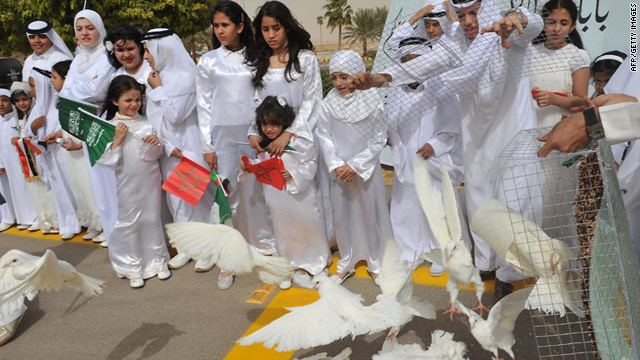Saudi king returns home to shaken Mideast
By the CNN Wire StaffcnnAuthor = "By the CNN Wire Staff";
if(location.hostname.indexOf( 'edition.' ) > -1) {document.write('February 23, 2011 -- Updated 1607 GMT (0007 HKT)');} else {document.write('February 23, 2011 11:07 a.m. EST');}February 23, 2011 11:07 a.m. EST
var clickExpire = "-1";
Saudis release white doves as they greet the convoy transporting King Abdullah upon his return to Riyadh on Wednesday.
STORY HIGHLIGHTS
var cnnRelatedTopicKeys = [];
(CNN) -- After three months abroad for medical treatment, Saudi Arabia's King Abdullah returned home Wednesday to a Middle East shaken by unrest, announcing a series of sweeping measures aimed at relieving economic hardship and meeting with Bahrain's beleaguered monarch.
King Abdullah's gestures of largess are not uncommon in a time of celebration, but the large scale of the measures -- the boost in spending amounts to billions of dollars -- raised the prospect of an attempt to stave off the kind of revolts that have engulfed neighboring nations.
The decrees, announced on state media, increase funding for social welfare programs, housing, employment and education, including funds to help needy students attend college.
"There probably would have been something like this anyway," said Christopher Boucek, an associate in the Middle East program at the Carnegie Endowment for International Peace. "But I don't think it's not completely unrelated (to the unrest)."
Boucek, who was last in Saudi Arabia in December, said the government was keenly aware of inflationary pressures on the people. The cost of food and housing, in particular, has been spiraling upward.
Undoubtedly, the Saudis are concerned about events in the region, especially in bordering Bahrain and Yemen. But Boucek said the Saudi government is much more apt to use methods of co-opting or persuasion than to use brutal force to quell opposition voices.
Adding to the Saudi dilemma is that soon the kingdom will have to deal with a pending transition of leadership, now composed of elderly men.
Bahrain's King Hamad was among those on hand to welcome King Abdullah home to Riyadh on Wednesday. It was expected they would discuss the protests in Bahrain, which analysts believe could spill over into Saudi Arabia's oil fields, located mostly in Shiite provinces.
The mass demonstrations in Bahrain have been Shiite-dominated, although Boucek cautioned that Saudi Arabia's Shiite population is much smaller and that King Abdullah has tried to promote a Saudi national image over religious differences.
But in another conciliatory move, the Saudi government released three Shiite political prisoners ahead of the king's return, said Boucek, who saw it as yet another way the Saudis were trying to manage festering issues.
King Abdullah, 86, had surgery last year at New York's Presbyterian Hospital/Weill Cornell Medical Center for a herniated disc and a blood clot that were causing him back pain. He spent the last few weeks in Morocco undergoing physical therapy.
By the CNN Wire StaffcnnAuthor = "By the CNN Wire Staff";
if(location.hostname.indexOf( 'edition.' ) > -1) {document.write('February 23, 2011 -- Updated 1607 GMT (0007 HKT)');} else {document.write('February 23, 2011 11:07 a.m. EST');}February 23, 2011 11:07 a.m. EST
var clickExpire = "-1";

Saudis release white doves as they greet the convoy transporting King Abdullah upon his return to Riyadh on Wednesday.
STORY HIGHLIGHTS
- King Abdullah was abroad for three months for medical treatment
- He returns to Saudi Arabia and announces sweeping decrees
- Bahrain's king is on hand to greet his Saudi counterpart
- The Saudis boost spending for social welfare, housing and education programs
var cnnRelatedTopicKeys = [];
(CNN) -- After three months abroad for medical treatment, Saudi Arabia's King Abdullah returned home Wednesday to a Middle East shaken by unrest, announcing a series of sweeping measures aimed at relieving economic hardship and meeting with Bahrain's beleaguered monarch.
King Abdullah's gestures of largess are not uncommon in a time of celebration, but the large scale of the measures -- the boost in spending amounts to billions of dollars -- raised the prospect of an attempt to stave off the kind of revolts that have engulfed neighboring nations.
The decrees, announced on state media, increase funding for social welfare programs, housing, employment and education, including funds to help needy students attend college.
"There probably would have been something like this anyway," said Christopher Boucek, an associate in the Middle East program at the Carnegie Endowment for International Peace. "But I don't think it's not completely unrelated (to the unrest)."
Boucek, who was last in Saudi Arabia in December, said the government was keenly aware of inflationary pressures on the people. The cost of food and housing, in particular, has been spiraling upward.
Undoubtedly, the Saudis are concerned about events in the region, especially in bordering Bahrain and Yemen. But Boucek said the Saudi government is much more apt to use methods of co-opting or persuasion than to use brutal force to quell opposition voices.
Adding to the Saudi dilemma is that soon the kingdom will have to deal with a pending transition of leadership, now composed of elderly men.
Bahrain's King Hamad was among those on hand to welcome King Abdullah home to Riyadh on Wednesday. It was expected they would discuss the protests in Bahrain, which analysts believe could spill over into Saudi Arabia's oil fields, located mostly in Shiite provinces.
The mass demonstrations in Bahrain have been Shiite-dominated, although Boucek cautioned that Saudi Arabia's Shiite population is much smaller and that King Abdullah has tried to promote a Saudi national image over religious differences.
But in another conciliatory move, the Saudi government released three Shiite political prisoners ahead of the king's return, said Boucek, who saw it as yet another way the Saudis were trying to manage festering issues.
King Abdullah, 86, had surgery last year at New York's Presbyterian Hospital/Weill Cornell Medical Center for a herniated disc and a blood clot that were causing him back pain. He spent the last few weeks in Morocco undergoing physical therapy.
Comment